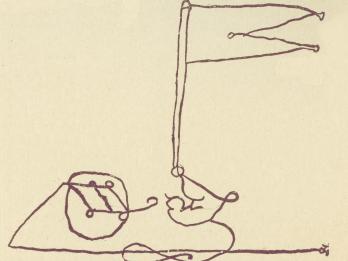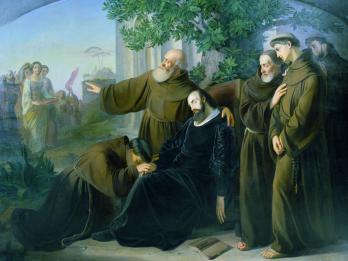Ḥayat kaneh (Wild Beast of the Reed)
Solomon Molkho
1531/32
A scion from Portugal by the name of Solomon Molkho sprouted forth from the trunk of Israel [see Isaiah 11:1] and spent his youth among the scribes of the king—where they had been scattered since the days of the persecutions. At that time, when he saw the man David [Reuveni], God touched him in his heart, and he returned to the Lord, the God of our fathers. He circumcised the flesh of his foreskin, even though he did not know anything about the Torah of the Lord or the Holy Scriptures in those days. Upon his circumcision, the Lord gave Solomon wisdom (1 Kings 5:26) and he became wiser than all men (1 Kings 5:11) in virtually an instant and amazed many people.
He moved to Italy where he courageously spoke about the Torah of the Lord our God in the presence of kings; he did not hide away from them. He then went to Turkey, before he returned to Rome and had an audience with [Pope] Clement [VII], who showed kindness to him [see Genesis 39:21], against the wishes of all his advisers. The Pope granted him written permission, signed in his own name, to settle down where he saw fit. He was given the name Israel, and he became wise in kabbalah; and a spirit of grace came forth from his mouth, for the spirit of the Lord spoke through him, and His word was always upon his tongue. He also drew out fine words from the sources of the depths of kabbalah, which he wrote upon tablets; such words that had not been heard up until that time.
He also preached his message to the masses in Bologna and other places, and many people flocked to him to hear his wisdom and to test him with riddles [see 1 Kings 10:1]. Solomon answered all of them; there was nothing hidden from him which he did not tell them [see 1 Kings 10:3]. When they saw the wisdom of Solomon they declared, “What we heard about you is true, and you have added much wisdom to the rumors we had heard!” [see 1 Kings 10:6–7]. Many people were jealous of him, but they could not harm him in Italy, as the princes like him. He joined forces with David, and they were unified in those days.
Solomon wrote words of truth and peace to the wise men: Great mountains, pillars of the exile who know the law and understand knowledge, who are of pleasing appearance before Him who abides in His dwelling place, and who have the strength to stand in the palace of the Holy King! You are tied with the bonds of the seventy faces of the Tree of Life, the Torah, the wall and the tall mountain surrounding the ruined city, may we merit to see it rebuilt, and may there be great peace [shalama] upon the throne of King Messiah. We are the seed that God has blessed from the heavens. Incline your ears to hear the words of one who is a worm and not a man [see Psalms 22:7], a scion from the trunk of the children of our exile, who came forth from our enemies, who settled in the forest and in the desert, in a place of weeds and thorns and thistles, where he grazed and rested. For his father and his mother had abandoned him [see Psalms 27:10], and he walked in darkness and had no light [see Isaiah 50:10]. At night on his bed, he remembered how light would be allotted, so that the dawn would know its place [see Job 38:12], to stay clear of the ways of the violent [see Psalms 17:4] so that he could follow the paths of God, to seek wisdom and hear truth. His heart was full of worry and grief at all times, in order to return his soul from the pit [see Job 33:18] to light, through the Light of life, to fortify himself with the right hand of God, and to expel the left hand from him [Molkho]. In his distress, a voice will sound out for him: “The holy shall make a dwelling of peace, for it is better to take refuge in the Lord than to trust in princes (Psalms 118:9), as they are crocodiles that will be lost, whereas He will stand forever. See and hear this, and give great respect to our God!”
In the twelfth month of the year 1521, symbolized by the verse: For I heard them say, let us go (Genesis 37:17)1 speedily to entreat the favor of the Lord, and to seek the Lord of hosts: I went also (Zechariah 8:21) to the foreigner’s neighborhood in the big city, which will be desolate in the future and whose land will become burning pitch [see Isaiah 34:9]. An emissary from your lofty level arrived there, holding a scroll that he unrolled before me. It was full of many pleasant words, which were as sweet as honey [see Ezekiel 3:3] to my intellect as I read them. I thought to give an answer that would somewhat approach your high level. Your honors are already aware of the vision about which I wrote from Monasterio to our teacher and master, the righteous and upright of Israel, R. Joseph Taitatsak. For while I was there, he asked me to tell him about my journey from Portugal. I wrote everything down for him; and I vowed, as is my wont, to write down as well all future events that would happen to me in the kingdom of Edom. In that vision, your excellences can see everything that occurred to me, from Portugal until my arrival from Turkey to the land of Edom, where I am in today, captured by the hand of the Supreme King, the Holy One, blessed be He, through His servant, my master David, without the permission to do anything other than what is revealed to me from the heavens.
Notes
[“Them say” (omrim) is the numerical equivalent of 291. [5]291 is the Hebrew year corresponding to 1521 CE.—Trans.]
Credits
Published in: The Posen Library of Jewish Culture and Civilization, vol. 5.




